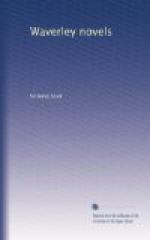After this ceremony was duly performed, the old Esculapius let his patient’s blood with a cupping-glass with great dexterity, and proceeded, muttering all the while to himself in Gaelic, to boil on the fire certain herbs, with which he compounded an embrocation. He then fomented the parts which had sustained injury, never failing to murmur prayers or spells, which of the two Waverley could not distinguish, as his ear only caught the words Gaspar-Melchior-Balthazar-max-prax-fax, and similar gibberish. The fomentation had a speedy effect in alleviating the pain and swelling, which our hero imputed to the virtue of the herbs or the effect of the chafing, but which was by the bystanders unanimously ascribed to the spells with which the operation had been accompanied. Edward was given to understand that not one of the ingredients had been gathered except during the full moon, and that the herbalist had, while collecting them, uniformly recited a charm, which in English ran thus:—
Hail to thee, them holy herb,
That sprung on holy ground!
All in the Mount Olivet
First wert thou found.
Thou art boot for many a bruise,
And healest many a wound;
In our Lady’s blessed
name,
I take thee from the ground.
[Footnote: This metrical spell, or something very like it, is preserved by Reginald Scott in his work on Witchcraft.]
Edward observed with some surprise that even Fergus, notwithstanding his knowledge and education, seemed to fall in with the superstitious ideas of his countrymen, either because he deemed it impolitic to affect scepticism on a matter of general belief, or more probably because, ike most men who do not think deeply or accurately on such subjects, he had in his mind a reserve of superstition which balanced the freedom of his expressions and practice upon other occasions. Waverley made no commentary, therefore, on the manner of the treatment, but rewarded the professor of medicine with a liberality beyond the utmost conception of his wildest hopes. He uttered on the occasion so many incoherent blessings in Gaelic and English that Mac-Ivor, rather scandalised at the excess of his acknowledgments, cut them short by exclaiming, Ceud mile mhalloich ort! i.e. ’A hundred thousand curses on you!’ and so pushed the helper of men out of the cabin.
After Waverley was left alone, the exhaustion of pain and fatigue —for the whole day’s exercise had been severe—threw him into a profound, but yet a feverish sleep, which he chiefly owed to an opiate draught administered by the old Highlander from some decoction of herbs in his pharmacopoeia.




